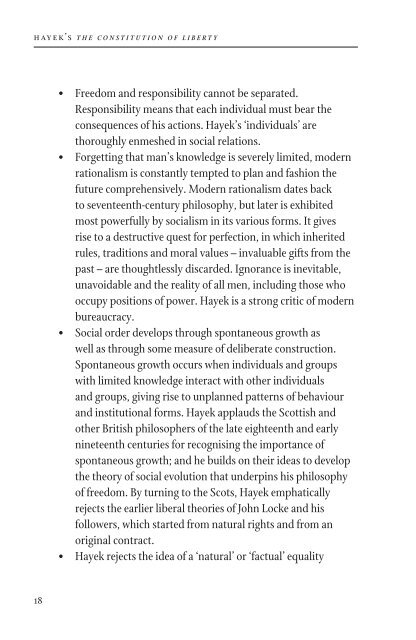Hayek's The Constitution of Liberty - Institute of Economic Affairs
Hayek's The Constitution of Liberty - Institute of Economic Affairs
Hayek's The Constitution of Liberty - Institute of Economic Affairs
You also want an ePaper? Increase the reach of your titles
YUMPU automatically turns print PDFs into web optimized ePapers that Google loves.
h ay e k ’ s t h e c o n s t i t u t i o n o f l i b e r t y<br />
s u m m a r y<br />
• Freedom and responsibility cannot be separated.<br />
Responsibility means that each individual must bear the<br />
consequences <strong>of</strong> his actions. Hayek’s ‘individuals’ are<br />
thoroughly enmeshed in social relations.<br />
• Forgetting that man’s knowledge is severely limited, modern<br />
rationalism is constantly tempted to plan and fashion the<br />
future comprehensively. Modern rationalism dates back<br />
to seventeenth-century philosophy, but later is exhibited<br />
most powerfully by socialism in its various forms. It gives<br />
rise to a destructive quest for perfection, in which inherited<br />
rules, traditions and moral values – invaluable gifts from the<br />
past – are thoughtlessly discarded. Ignorance is inevitable,<br />
unavoidable and the reality <strong>of</strong> all men, including those who<br />
occupy positions <strong>of</strong> power. Hayek is a strong critic <strong>of</strong> modern<br />
bureaucracy.<br />
• Social order develops through spontaneous growth as<br />
well as through some measure <strong>of</strong> deliberate construction.<br />
Spontaneous growth occurs when individuals and groups<br />
with limited knowledge interact with other individuals<br />
and groups, giving rise to unplanned patterns <strong>of</strong> behaviour<br />
and institutional forms. Hayek applauds the Scottish and<br />
other British philosophers <strong>of</strong> the late eighteenth and early<br />
nineteenth centuries for recognising the importance <strong>of</strong><br />
spontaneous growth; and he builds on their ideas to develop<br />
the theory <strong>of</strong> social evolution that underpins his philosophy<br />
<strong>of</strong> freedom. By turning to the Scots, Hayek emphatically<br />
rejects the earlier liberal theories <strong>of</strong> John Locke and his<br />
followers, which started from natural rights and from an<br />
original contract.<br />
• Hayek rejects the idea <strong>of</strong> a ‘natural’ or ‘factual’ equality<br />
between men. At the same time, he insists that individuals<br />
have a ‘dignity’ that we must respect. Hayek promises ‘an<br />
ultimate justification’ for freedom, which must be connected<br />
somehow to this idea <strong>of</strong> individual dignity: but he leaves the<br />
matter quite unclear. He does insist strongly that the Rule <strong>of</strong><br />
Law permits social inequalities, whose beneficial results are<br />
generally overlooked by the misguided advocates <strong>of</strong> ‘social<br />
justice’.<br />
• Hayek regards democracy as the best practicable form <strong>of</strong><br />
government, so long as a majority <strong>of</strong> the community is<br />
committed to individual liberty, the Rule <strong>of</strong> Law and limited<br />
government. Democracy is not a primarily a way <strong>of</strong> life, but a<br />
set <strong>of</strong> procedures for organising and operating government.<br />
<strong>The</strong>re are no inherent substantive ends or core beliefs that are<br />
essential to democratic rule. By conceding that the majority<br />
<strong>of</strong> a community may embrace any set <strong>of</strong> core beliefs that it<br />
chooses, Hayek is left with no basis for opposing totalitarian<br />
democracies on democratic grounds.<br />
• Hayek applies his understanding <strong>of</strong> the evolutionary<br />
development <strong>of</strong> society in general to the growth <strong>of</strong> legal<br />
institutions and the Rule <strong>of</strong> Law. He traces this growth to<br />
England, America and Germany, but largely excludes French<br />
legal thought, which has favoured a rationalistic approach to<br />
the law which runs counter to a free society.<br />
• <strong>The</strong> ‘ideal’ <strong>of</strong> the Rule <strong>of</strong> Law requires that existing laws<br />
share certain characteristics. Law must be general; it must be<br />
known and certain and apply equally to all; it must provide<br />
for an independent judiciary; it must limit the executive<br />
by legislative and judicial rules; and it must safeguard<br />
fundamental rights and civil liberties.<br />
18<br />
19












